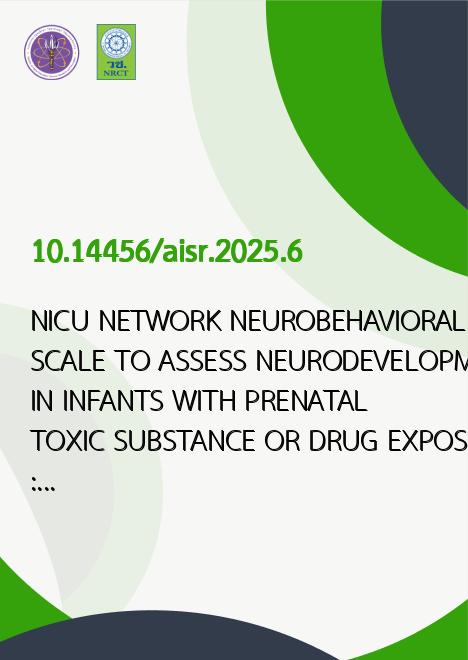
|
NICU NETWORK NEUROBEHAVIORAL SCALE TO ASSESS NEURODEVELOPMENT IN INFANTS WITH PRENATAL TOXIC SUBSTANCE OR DRUG EXPOSURE: A SYSTEMATIC REVIEW |
|---|---|
| รหัสดีโอไอ | |
| Creator | Supattra SITTIWANG |
| Title | NICU NETWORK NEUROBEHAVIORAL SCALE TO ASSESS NEURODEVELOPMENT IN INFANTS WITH PRENATAL TOXIC SUBSTANCE OR DRUG EXPOSURE: A SYSTEMATIC REVIEW |
| Contributor | Panrapee SUTTIWAN, Nancy FIEDLER |
| Publisher | Asian Interdisciplinary and Sustainability Review |
| Publication Year | 2568 |
| Journal Title | Asian Interdisciplinary and Sustainability Review |
| Journal Vol. | 14 |
| Journal No. | 1 |
| Page no. | Article 6 |
| Keyword | NICU Network Neurobehavioral Scale, Neurodevelopment, Infants, Prenatal Exposure, Drug Exposure |
| URL Website | https://so05.tci-thaijo.org/index.php/PSAKUIJIR |
| Website title | https://so05.tci-thaijo.org/index.php/PSAKUIJIR/article/view/277352 |
| ISSN | 3027-6535 |
| Abstract | This systematic review examines the use of the NICU Network Neurobehavioral Scale (NNNS) in assessing neurodevelopment in infants prenatally exposed to toxic substances or drugs. Thirteen studies (2010-2024) were reviewed, focusing on exposures to air pollution, bisphenol A and phthalates, mercury, metal, pesticides, tobacco, methamphetamine, marijuana, methylenedioxymethamphetamine, and methadone. Sample sizes ranged from 28 to 658 infants, with assessments conducted from birth to 37 days postpartum. Data on exposure was collected via maternal samples, infant meconium and saliva, placenta tissue biopsy, and records such as self-reports during pregnancy, interviews, and medical records. Findings revealed that prenatal exposure to toxic substances showed both detrimental effects and, in some cases, unexpected positive outcomes. In contrast, drug exposure was primarily linked to adverse impacts, including impairments in self-regulation, attention, quality of movement, and stress responses. In conclusion, the NNNS is a valuable tool for assessing neurobehavioral outcomes in infants prenatally exposed to toxic substances and drugs. These findings highlight the importance of early neurodevelopmental assessments to inform timely interventions for at-risk infants. |
